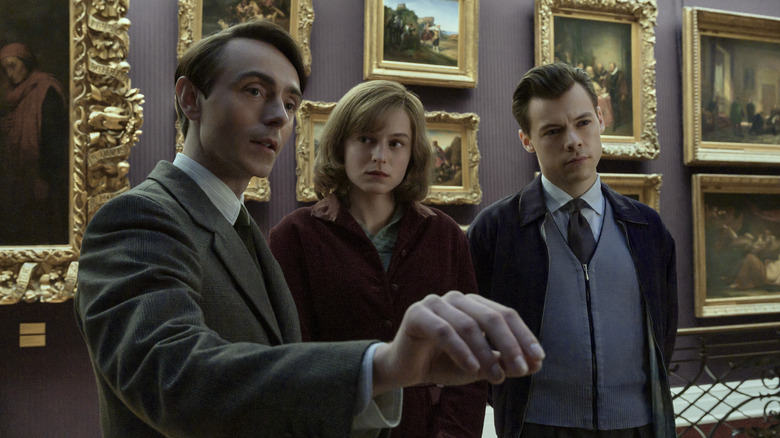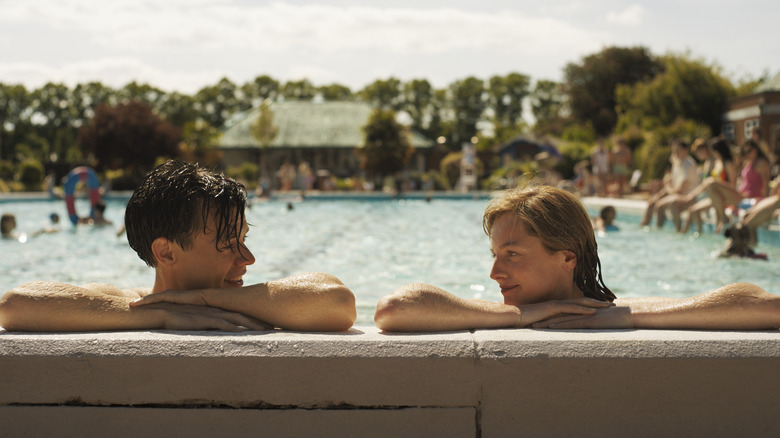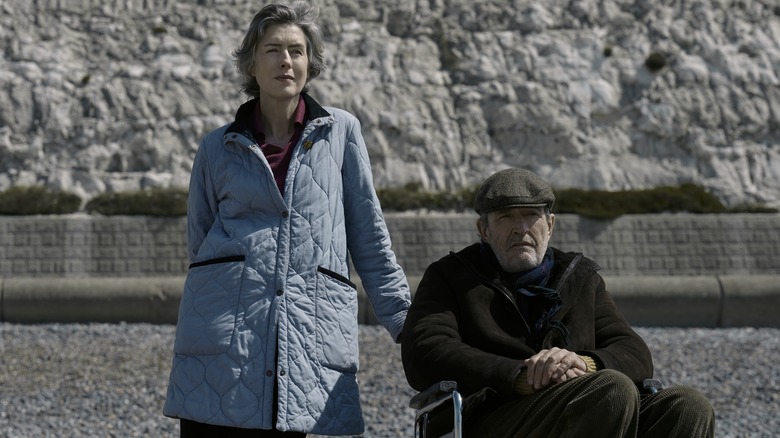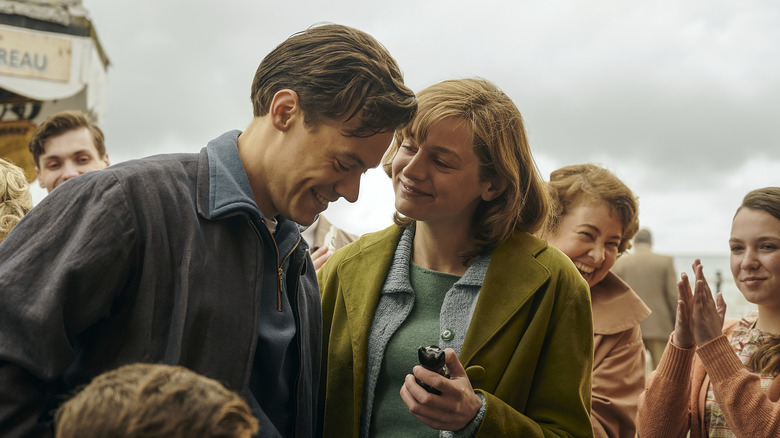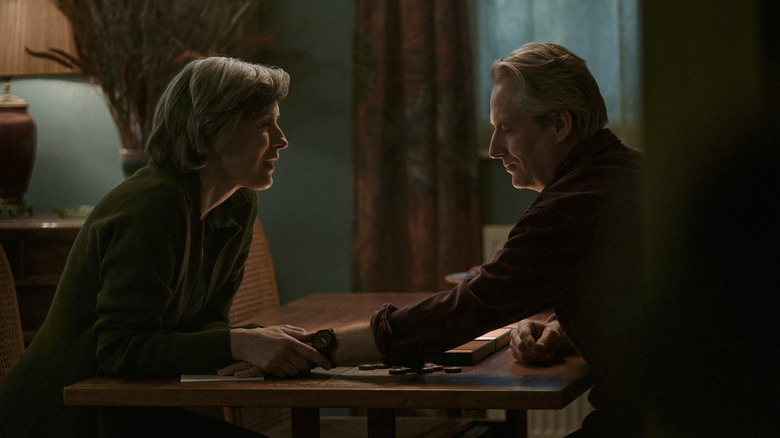My Policeman Review: A Visually Appealing Romantic Drama Burdened By Structural Confusion
A good romantic drama gives you a poignant ride you'll never forget while making you believe that love can make anything happen. But in "My Policeman," that ride stains your memory with transgressions and betrayals, and love makes people do things they regret. Whether or not the film can be considered a "good" romantic drama will probably be the subject of debate, but there's no denying that the Prime Video picture doesn't entirely amount to the sum of its parts, which are actually mostly good despite some core structural slowdowns that mar the overall experience. In fact, it feels like this one has the potential to build a second life on streaming. Either way, "My Policeman" is a touching and sometimes laborious emotional roller coaster that is sure to leave not one dry eye in whatever living room you choose to watch it in.
"My Policeman" tells the story of Tom (Harry Styles) and Marion (Emma Corrin), a married couple in 1950s England who find themselves inviting Patrick (David Dawson), an intriguing art curator, into their lives in ways neither of them realizes will completely change them forever. Tom and Patrick fall into an intense affair, while Patrick and Marion forge a tender bond — but nothing prepares her for the truths she will find about her husband and who she will become in the process. Years later, Marion (Gina McKee) brings Patrick (Rupert Everett) back into their lives in an effort to grapple with her guilt and forces herself to confront his past with Tom (Linus Roache). In a seismic turn of events, she drives Tom to do the same once and for all.
Sights and sounds
"My Policeman" is beautiful to look at, full of stunning shots of the seaside city of Brighton both at rest and at play. It captures people and their beauty as well as it captures the appeal of the scenic landscapes of the coastal English town where it takes place. The movie puts a heavy focus on art, and there is lots of it throughout the film. Better still, the film treats a lot of the shots like paintings themselves and clearly deeply appreciates art and what visual mediums can set fire to within the human heart. The commentary is there with intent and it is noticeable to the naked eye. It elevates the film experience as a whole; Who doesn't love to watch a movie that is wall-to-wall filled with utterly pleasing pictures?
A beautiful yet haunting score carries the audience through "My Policeman," and composer Steven Price — who is perhaps best known for his score for "Gravity," which won an Academy Award in 2013 — draws us in through really sweeping yet intimate work. It's the kind of score you expect in a romantic drama, but not in a way that feels tired or overused. The music has a great command of tone, swelling in the moments of passion throughout the film and taking on a more quiet, contemplative timbre in the moments of solitude or pensive thought.
There's one particular moment in the film where Price employs a piece of raging choral music to encapsulate how Tom is seen by the other two main characters in the film, and it's done impeccably well. The music of the scene — along with some very specific, minute, yet important acting — does all the talking, and dialogue is simply not needed. It's an example of a good score acting in service of a film, and the music of "My Policeman" does just that throughout the movie's somewhat stretched runtime.
Strong actors making strong choices
As for the performances in "My Policeman," there's quite a bit to be said. Dawson is the acting standout of this film — His performance is layered with deep nuance, and it is unflinchingly raw and emotional in so many standout moments, even when the choices he makes as Patrick are small or seemingly unimportant. Dawson does well to make Patrick a three-dimensional character of the highest order, someone who is relatable, alluring, and infatuating, someone we care for deeply throughout the film. Frankly, Dawson is on fire with confidence and sheer skill in this role; I'm excited to see what doors open for him via this unmissable performance.
Corrin is also effective as Marion, a complicated character who struggles with her place in the world, and maybe it's just because she's so instinctual as an actor. But Corrin has a particular talent for holding tight to the core of her character's emotional life, and her ability to play internal conflict works well for this role. Similarly, the cast of older actors also had that skill in spades. All three actors spend a lot of time, and for Everett, all of his heart-wrenching screen time, grappling with emotional turmoil and the realities of time lost, and it hits hard. They each, in their own character-driven ways, sell the harsh fact that if you miss the moment, it's gone to every single audience member, and because of that accomplishment, the adult cast are the ones to thank for the impact of the film's undeniable tear-jerker ending.
Room for improvement
Styles is probably the weakest performer in the film, but that's not entirely his fault. He's surrounded by seasoned and well-skilled talent to the point where it's sometimes hard to not easily catch him falling back into how green he really is in this arena. He hasn't quite figured out how to give an instinctively layered reaction that veers in the direction of anger or raging sadness quite yet, and it highlights his newness to the craft.
That said, he has some excellent, full moments, particularly when Tom's charisma is center stage and it shows promise for future roles if he continues acting in a significant way (meaning more than just another Marvel cameo). The film, and the book to a similar extent, focus on how both Marion and Patrick put Tom on a pedestal, and Styles really is excellent casting for capturing why these two people could fall so deeply in love with his character. To the same end, the trio feeds very well off one another, which makes the stakes of their complicated relationships feel stronger throughout the film, even when the pacing and structure of the movie undermines that strength.
Structural snafus
Those two issues are perhaps the biggest missteps in this film, with mostly the movie's script and direction to blame here. Screenwriter Ron Nyswaner, whose most famous work is the 1993 drama "Philadelphia," brings a lot of great character elements to this story, and it feels based on this script that character is his strong suit, but the pacing of the film doesn't serve the delicate treatment these characters deserve.
The chronological events of the story feel rushed, even though we intrinsically move forward to go back with intent. Despite that structural choice and its successful usage in the first half of the film, its continued use starts to get messy and somewhat harder to follow. Michael Grandage's gifts as a smart theatre director are even less on display. The tactics one uses for the stage are usually far from what they employ with a screen project, but the director doesn't step out of the conventional box at all with this movie. The film has a flawed script for Grandage to work from, yes, but he also doesn't do much to punch up Bethan Roberts' novel source material from a directorial standpoint, either.
"My Policeman" is a pretty flat adaptation as far as adaptations go, and despite some great elements in the film overall, Grandage's theatrical flair and passion doesn't show up anywhere in this movie, giving the picture an almost cookie-cutter feel to it in a way that comes off as strangely commercial. It would have been nice to see him step outside his comfort zone, especially as the story's subject matter calls for it, but overall other elements from the core of the film picked up Grandage's slack and built a devastating romance with potential.
/Film rating: 5 out of 10
